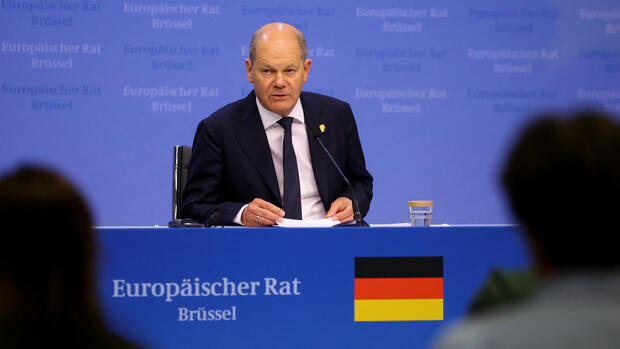Brussels “Derisking”, the reduction of risk in economic relations with China, is a strategy that many politicians are currently relying on. EU Commission chief Ursula von der Leyen used the term in March when she outlined a new China policy. In April, Federal Secretary of Commerce Annalena Baerbock and US National Security Advisor Jake Sullivan endorsed the formulation.
But the authorship of the term, at least in the political sphere, can be claimed by Olaf Scholz of all people – the Federal Chancellor, who is actually intent on avoiding tensions with China. As early as last November, shortly after his first trip to China as head of government, Scholz said what needs to be done in relation to the People’s Republic: “Strengthening resilience, diversifying our economic and trade relations, derisking, to put it that way.”
Derisking has been official EU policy since this Friday. At their summit meeting in Brussels, the heads of state and government agreed that the “European Union would continue to reduce critical dependencies and vulnerabilities, including in its supply chains” and, “where necessary and appropriate”, would strive to “reduce and diversify risks “.
The Europeans have not been impressed by Chinese Prime Minister Li Qiang’s recent warnings that he is politicizing trade relations with the strategy of derisking and thus damaging free trade. However, they stressed that the EU has no intention of “decoupling or closing itself off” from China.
The summit was overshadowed by Hungary’s and Poland’s refusal to support the compromise on migration recently found by the interior ministers. The year-long dispute over European asylum policy, as much became clear at the EU summit, is long over – and the risk of escalation is real.
Disagreements between the EU Commission and states
But at least in China policy, Scholz was able to report a “very big consensus” after the two-day meeting. It’s about making sure “that we don’t have any strategic dependencies – not companies, not the economies,” said Scholz.
It is interesting what Scholz left out: the concept of economic security that Commission President von der Leyen presented last week. Economic security is also not mentioned in the final declaration of the summit.
>> Read here: The EU presents anti-China plans – focusing on three areas in particular
This shows that the ideas of the Commission go too far for the member states. Because von der Leyen’s concept provides for state intervention in company decisions in order to accelerate the process of risk reduction.
The German economy would be particularly affected. Corporations such as BASF, VW and Mercedes-Benz are heavily focused on the Chinese market and depend on the profits they generate there. The concern in Brussels is that this dependency leaves all of Europe open to blackmail and narrows the scope for sanctions should China invade Taiwan.
According to the ideas of the EU Commission, risk reduction should therefore be politically controlled. She plans to tighten export regulations for goods that could be used by the Chinese military. The control of Chinese investments in the EU is to be strengthened and, for the first time, a state examination of European investments in China is to be introduced.
>> Read here: EU Commission demands “immediate” Huawei ban
Scholz made it clear that he understood something different by derisking. “You have to know that this is not a short-term project,” he said, since it is primarily about decisions by the private sector. Scholz criticized that in the course of globalization “many companies took very big risks because things went well”. Concentrating on one supplier and “putting all your eggs in one basket” is “always risky”.
But for the chancellor, it is not up to the government to reduce these dependencies, but rather a task for the companies, which are already tackling this. “They started doing that a long time ago,” emphasized Scholz, “that’s mostly not government action at all.” The government would not decide where a company should invest and where not.
Brussels and Washington for state intervention
But that is exactly what the derisking debate is about – at least from the point of view of the EU Commission and the US government. Outbound investment screening is the name of a new policy tool currently being developed in Brussels and Washington. It would create a state veto option for certain investments by western companies in China. In the event that such an investment would result in knowledge about the production of state-of-the-art microprocessors, the construction of quantum computers and the use of artificial intelligence.
The EU Commission and the US government want to prevent investments if they could betray important knowledge to China.
(Photo: IMAGO/UPI Photo)
So, on closer inspection, the “very big consensus” that the chancellor identified in China policy turns out to be the lowest common denominator. For Scholz, reducing critical dependencies is primarily a question of company risk management.
>> Read here: China warns against politicizing world trade
The EU Commission and the US government understand the concept of derisking very differently: as a mandate to correct corporate decisions if necessary if they result in risks to state security.
At least in America there is also support from the economy. US investment banker Peter Orszag told Handelsblatt a few days ago: “If the US doesn’t succeed in convincing Europe, and especially Germany, to reduce its dependence on China, derisking won’t work.”
More: Huawei technology – Ministry of Interior has evidence of security problems
